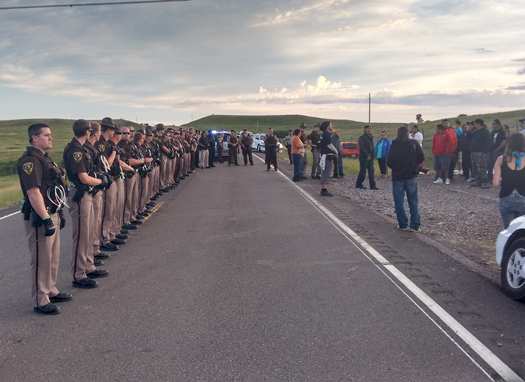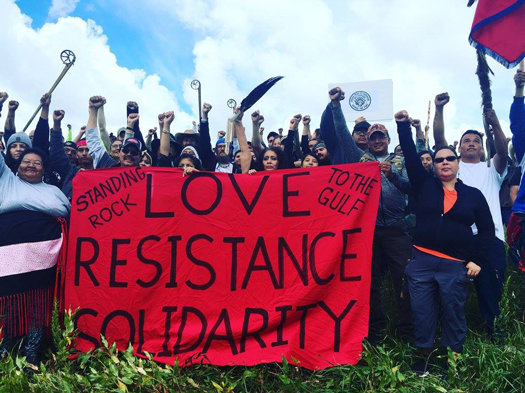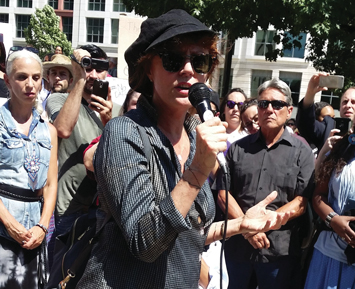Native Americans, Allies Vow To Protect Sacred Spaces From Unwanted Oil Pipeline
By Askia Muhammad -Senior Editor- | Last updated: Aug 31, 2016 - 7:20:28 AMWhat's your opinion on this article?

Police line up before protesters near the construction site of the Dakota Access oil pipeline. Photo: Standing Rock Dakota Access.Pipeline Opposition/Facebook
|

Photo: Facebook/No Dakota Access in Treaty Territory - Camp of the Sacred Stones
|
WASHINGTON—Drumming and chanting could be heard blocks away from the federal courthouse as tribal representatives from the Standing Rock Sioux Nation and 1,000 “protectors” rallied in support of the tribe’s lawsuit against the Army Corps of Engineers. The suit intends to protect their water and land, in opposition to the $3.8 billion Dakota Access pipeline.
The Standing Rock Sioux Tribe filed a lawsuit against the Army Corps of Engineers in July to stop the pipeline that would cross under the Missouri River, the reservation’s sole source of water. The corps approved the 1,168-mile pipeline in July, but the tribe argues they were not properly consulted, and that cultural and historical sites would be destroyed during construction.
Judge James Boasberg announced that he will make a decision about the pipeline on or before Sept. 9.

|
“We sued with farmers, and ranchers and Native allies to stop the Keystone-XL Pipeline, and we’re here today to make sure everybody knows, including the press—our Native brothers and sisters already know this. We’ll bring cows. We’ll bring horses; we’ll bring whatever it takes in order to stop this pipeline. We just want to make sure that President Obama hears us loud and clear: the people will not let this pipeline be built,” Ms. Kleeb said.
In North Dakota, thousands of indigenous people from dozens of tribes gathered at the Sacred Stone Spirit Camp to block the pipeline’s construction. Camp leaders announced they’d continue the camp until the next trial date.
“We need each other. We have to stand together in unity to protect sacred water and Mother Earth,” protestor Vic Camp said at the Standing Rock protest, according to a published report. “We stand with our chanunpa. We stand with our wives and our children and our grandparents. We stand with Ozuye to protect Mother Earth.”
Amnesty International says it is sending a delegation to Sacred Stone Spirit Camp to monitor the police and law enforcement’s response to the ongoing protests. In Washington, D.C., actress Susan Sarandon, as well as many other high profile allies joined in solidarity, demanding a full halt to all construction activities and a repeal of all pipeline permits until formal tribal consultation and environmental reviews are conducted.
“I’m a mother. I’m a grandmother,” Oscar award-winning actress Susan Sarandon told the rally. “As a mother and a grandmother, I’m here to thank the Standing Rock community and all the other indigenous people who have come forward to make this space for us to make a statement in saving their water to save ours. This is all connected.” Ms. Sarandon stood shoulder-to-shoulder at the Aug. 24 rally with anti-fracking activist and documentary filmmaker Josh Fox.
“Anything is possible when people get together in the name of justice,” Mr. Fox told the rally. “That’s how we’re going to stop the Dakota Access Pipeline, because it is unjust, it is a threat to the water, and it is a threat to the entire world because it would exacerbate climate change.”
Civil disobedience is another important tactic those who called themselves “protectors, not protestors” will use in the future. They recall that 1,200 were in front of the White House protesting the Keystone XL Pipeline.
The proposed pipeline would shuttle Bakken shale from North Dakota directly to refineries on the U.S. Gulf Coast.
“We’re very concerned because construction is ongoing,” said Jan Hasselman, a lawyer with Earth Justice, an environmental advocacy organization representing the Standing Rock Sioux Tribe. “In another couple of weeks or a month there won’t be anything left to protect.”

Oscar-winning actress Susan Sarandon at Native Water Rights rally.Photo: Askia Muhammad
|
Lawyers for the Corps and Energy Transfer Partners, the Texas-based company building the pipeline, rejected the tribe’s claims, saying there is no evidence there are historic artifacts in the path of this pipeline, and that invitations for consultation were rejected.
The tribe, whose land is located a half-mile south of the pipeline, has resisted the project for months. People started gathering near the construction site in Cannon Ball, North Dakota, in April to stage demonstrations. In recent weeks, hundreds more arrived, and some sparked confrontations with police and construction workers. At least 28 people were arrested for disorderly conduct and trespassing in August. The pipeline company says it halted work after some demonstrators clashed with workers.
“The need to protect this water, (this) has grown way beyond Standing Rock,” Debra White Plume, an Oglala Lakota water rights activist, speaking at the Sacred Stone camp said on “Democracy Now!”
“I’m Oglala and Northern Cheyenne. Many Red nations are here. Many more Red nations are coming. We put the call out for water protectors to come, land defenders to come. And the word ‘resistance’ is being used. And sometimes we have a problem with the English language, deciding which word to use, but if we just listen to our spirits, we’re here to protect sacred water. People will come from all along the river to protect the river that they belong to.”
“What’s happening here is equally as important, because of the stand that you’re ready to make. When they threaten the environment, they’re threatening you,” legendary Native activist Dennis Banks, co-founder of the American Indian Movement said. “We are part mountain. We are part ocean. We are part river. We are part flower and grass and tree. All of this, we are part of all of it, so that when they threaten the environment anyplace, they’re threatening you. You have to be in that mindset like that. That’s who you are. That’s who we are. And our culture, our heritage is what has made us warriors.”
Mr. Banks took part in the protests against the Dakota pipeline, and he also was part of the 1973 Wounded Knee standoff.
Debra White Plume also participated in the Wounded Knee protest. “We’re putting a call out for warriors to come here to do direct action, to stop them from boring under this water, because that’s going to contaminate it. We can’t stand for that. We can’t let that happen. I, for one, made a commitment. They’re going to have to kill me, or they’re going to have to lock me in jail, but I’m going to stand to protect the sacred water. And I’m guided by spirit.
“I understand that rage. I fought with cops before,” Ms. White Plume said. “I’ve been shot at by police. I’ve been shot by police. We got it on with the police on Pine Ridge back in the day. So I understand that rage. But when we’re here together to protect sacred water, let’s do it with dignity, let’s do it with training, let’s do it with unity”
Again and again Native activists reiterated their core theme: “Respect our water! Respect our lands! Honor our treaties! Honor our rights!”
INSIDE STORIES AND REVIEWS
-
-
About Harriett ... and the Negro Hollywood Road Show
By Rabiah Muhammad, Guest Columnist » Full Story -
Skepticism greets Jay-Z, NFL talk of inspiring change
By Bryan 18X Crawford and Richard B. Muhammad The Final Call Newspaper @TheFinalCall » Full Story -
The painful problem of Black girls and suicide
By Charlene Muhammad -National Correspondent- » Full Story -
Exploitation of Innocence - Report: Perceptions, policies hurting Black girls
By Charlene Muhammad -National Correspondent- » Full Story -
Big Ballin: Big ideas fuel a father’s Big Baller Brand and brash business sense
By Bryan Crawford -Contributing Writer- » Full Story






 Click Here Stay Connected!
Click Here Stay Connected!








